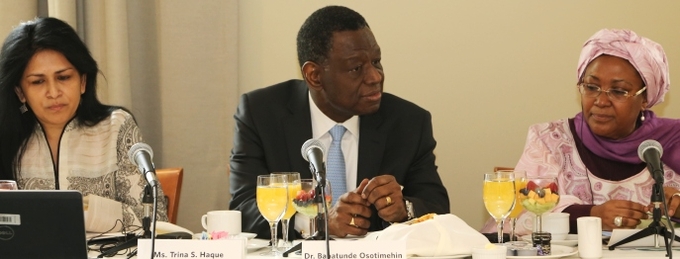
UNFPA Executive Director Dr. Babatunde Osotimehin and representatives of the World Bank were joined by Ministers from Benin, the Democratic Republic of the Congo, and Niger, who shared their experiences on issues that pose the greatest challenges to women, girls and youth in their countries.
“UNFPA and the World Bank Group are committed to working together to promote gender equality and women’s empowerment in the Sahel and Great Lakes regions,” said Dr. Osotimehin. “I share the conviction with the leadership of the World Bank that this is the time to invest in Africa, particularly in young people, so that they can become the agents of peacebuilding and peacekeeping.”
During a historic visit to the Sahel by a high-level delegation in November 2013, the World Bank Group and UNFPA responded to the “Niamey Call to Action” where the Bank pledged $100 million to UNFPA to invest in women’s empowerment and the demographic dividend – a linchpin of the UNFPA mandate. The demographic dividend refers to the potential economic growth that can be experienced as a result of changes in the age structure of a population following a decline in fertility, giving families and governments the opportunity to allocate more resources to meet the needs of the youngest generations and contributing to an increase in human capital, poverty reduction and more sustained economic growth.
Earlier in the year, the Executive Director also joined the high-level mission to the Great Lakes Region where gender-based violence and other challenges that face women and girls, including reproductive health and rights and obstetric fistula, were among the key issues highlighted.
The relationship between gender-based violence and the development and security agendas has become clear. “What is required is a multi-dimensional response that not only addresses the needs of the survivors of gender-based violence, but also empowers women economically and through education, and addresses the culture of impunity that often characterizes these situations,” said Ms. Trina Haque, Sector Manager for the World Bank Health, Nutrition and Population in West and Central Africa.



